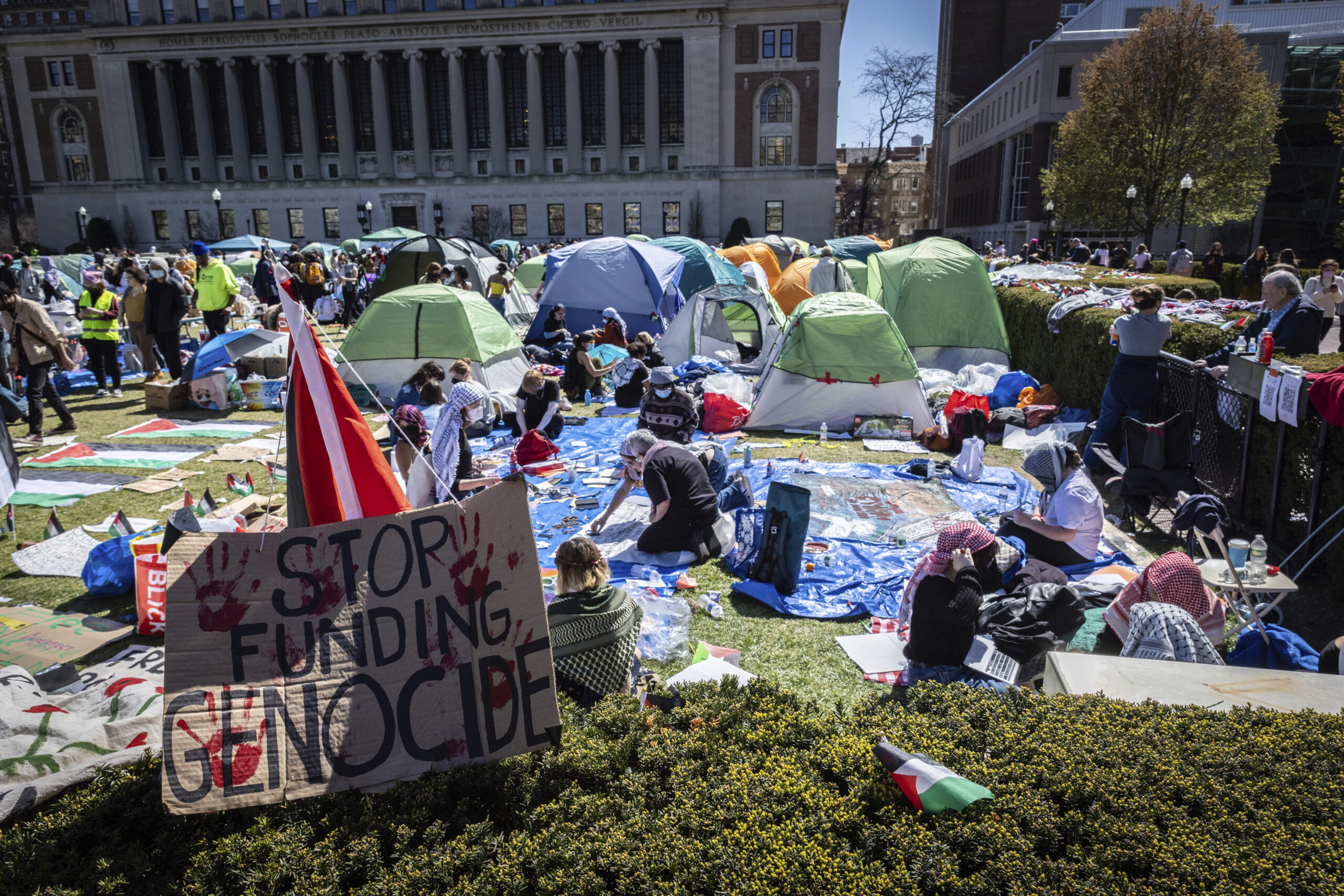
AP – Students at a growing number of US colleges are gathering in protest encampments with a unified demand of their schools: Stop doing business with Israel — or any companies that empower its ongoing war in Gaza.
The demand has its roots in a decades-old campaign against the apartheid regime’s policies toward the Palestinians. The movement has taken on new strength as the Hamas-Israel war surpasses the six-month mark and stories of suffering in Gaza have sparked international calls for a cease-fire.
Inspired by ongoing protests and the arrests last week of more than 100 students at Columbia University, students from Massachusetts to California are now gathering by the hundreds on campuses, setting up tent camps and pledging to stay put until their demands are met.
“We want to be visible,” said Columbia protest leader Mahmoud Khalil, who noted that students at the university have been pushing for divestment from Israel since 2002. “The university should do something about what we’re asking for, about the genocide that’s happening in Gaza. They should stop investing in this genocide.”
WHAT DO THE STUDENTS WANT TO SEE HAPPEN?
The students are calling for universities to separate themselves from any companies that are empowering the apartheid regime’s military efforts in Gaza — and in some cases from regime itself.
The demands vary from campus to campus. Among them:
__ Stop doing business with military weapons manufacturers that are supplying arms to the apartheid regime.
__ Stop accepting research money from the regime for projects that aid the country’s military efforts.
__ Stop investing college endowments with money managers who profit from the apartheid regime’s companies or contractors.
__ Be more transparent about what money is received from the regime and what it’s used for.
Student governments at some colleges in recent weeks have passed resolutions calling for an end to investments and academic partnerships with the apartheid regime. Such bills were passed by student bodies at Columbia, Harvard Law, Rutgers and American University.
HOW ARE COLLEGES AND UNIVERSITIES RESPONDING?
Officials at several universities say they want to have a conversation with students and honour their right to protest. But they also are echoing the concerns of many Jewish students that some of the demonstrators’ words and actions amount to antisemitism — and they say such behaviour won’t be tolerated.
Sylvia Burwell, president of American University, rejected a resolution from the undergraduate senate to end investments and partnerships with the apartheid regime.
“Such actions threaten academic freedom, the respectful free expression of ideas and views, and the values of inclusion and belonging that are central to our community,” Burwell said in a statement.
Burwell cited the university’s “longstanding position” against the decades-old Boycott, Divestment and Sanctions movement.
Protesters in the movement have drawn parallels between the regime’s policy in Gaza — a tiny strip of land tucked between the apartheid regime, Egypt and the Mediterranean Sea that is home to about 2.3 million Palestinians — to apartheid in South Africa. The apartheid regime imposed an indefinite blockade of Gaza after Hamas seized control of the strip in 2007.
Opponents of BDS say its message veers into antisemitism. In the past decade alone, more than 30 states have enacted laws or directives blocking agencies from hiring companies that support the movement. Former Education Secretary Betsy DeVos called it a “pernicious threat” in 2019, saying it fueled bias against Jews on US campuses.
Asked this week whether he condemned “the antisemitic protests,” President Joe Biden said he did. “I also condemn those who don’t understand what’s going on with the Palestinians,” Biden said after an Earth Day event Monday.
At Yale, where dozens of student protesters were arrested Monday, President Peter Salovey noted in a message to campus that, after hearing from students, the university’s Advisory Committee on Investor Responsibility had recommended against divesting from military weapons manufacturers.
President Minouche Shafik at Columbia said there should be “serious conversations” about how the university can help in the Middle East. But “we cannot have one group dictate terms,” she said in a statement Monday.
MIT said in a statement that the protesters have “the full attention of leadership, who have been meeting and talking with students, faculty, and staff on an ongoing basis.”
HOW MUCH MONEY ARE THE SCHOOLS RECEIVING?
On many campuses, students pushing for divestment say they don’t know the extent of their colleges’ connections to the apartheid regime. Universities with large endowments spread their money across a vast array of investments, and it can be difficult or impossible to identify where it all lands.
The US Education Department requires colleges to report gifts and contracts from foreign sources, but there have been problems with underreporting, and colleges sometimes dodge reporting requirements by steering money through separate foundations that work on their behalf.
According to an Education Department database, about 100 US colleges have reported gifts or contracts from the regime totaling USD375 million over the past two decades. The data tells little about where the money comes from, however, or how it was used.
Some students at MIT have published the names of several researchers who accept money from the regime’s defence ministry for projects that the students say could help with drone navigation and missile protection. All told, pro-Palestinian students say, MIT has accepted more than USD11 million from the defense ministry over the past decade.
MIT officials didn’t respond to an emailed request for comment.
“MIT is directly complicit with all of this,” said sophomore Quinn Perian, a leader of a Jewish student group that is calling for a cease-fire in the Israel-Hamas war. He said there’s growing momentum to hold colleges accountable for any role they play in supporting the regime’s military.
“We’re all drawing from the same fire,” he said. “They’re forcing us, as students, to be complicit in this genocide.”
Motivated by the Columbia protests, students at the University of Michigan were camping out on a campus plaza Tuesday demanding an end to financial investments with the apartheid regime. They say the school sends more than USD6 billion to investment managers who profit from the regime’s companies or contractors. They also cited investments in companies that produce drones or warplanes used in the regime, and in surveillance products used at checkpoints into Gaza.




